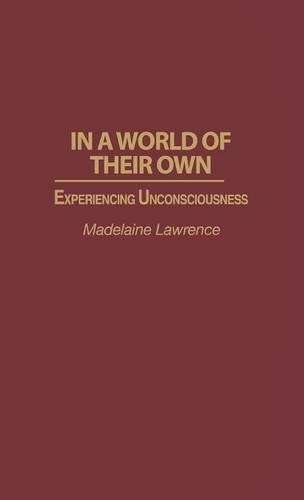
In a World of Their Own: Experiencing Unconsciousness
(Hardback)
Available Formats
Publishing Details
In a World of Their Own: Experiencing Unconsciousness
By (Author) Madelaine Lawrence
Bloomsbury Publishing PLC
Praeger Publishers Inc
21st January 1997
United States
Classifications
Tertiary Education
Non Fiction
The afterlife, reincarnation and past lives
Neurology and clinical neurophysiology
Unexplained phenomena / the paranormal
154.4
Physical Properties
Hardback
200
Description
Up until now, we have had little knowledge of what the state of unconsciousness was like from the patient's point of view. Surprisingly, in a state considered void of human experiences, Lawrence found that the events subjects reported were extraordinary. Her research in hospital units and in the literature reveals that more than 70% of the individuals who regain consciousness remember events during their unconscious period. They heard and understood conversations, had inner dialogues, recognized their emotions, and went out of their bodies. As would be expected, some of the patients' experiences are the now-recognized classic NDEs (near-death experiences). The author also includes descriptions of related research from nursing, medicine, psychology, and parapsychology. The phenomena described in the book are not easily explained by the paradigm of one discipline. It is the author's point of view that because the phenomena crosses the lines of many disciplines, the answer to understanding and explaining the experiences can be obtained only by using theories and research methods from a variety of related disciplines. The integration of research from such varied disciplines brings a unique perspective to the chapters. Also included are suggestions for caregivers and families about what can be done for patients during their unconscious episode and after their recovery.
Reviews
"The scientific literature rarely discusses total unconsciousness, but this valuable book recounts 100 hospital patients' "lived experiences of being unconscious.,.".Lawrence does a commendable job of summarizing explanatory mechanisms from studies in sensory deprivation, personality theory, pharmacology, biophysiology, and parapsychology....[T]here is much welcome information here."-Choice
The scientific literature rarely discusses total unconsciousness, but this valuable book recounts 100 hospital patients' "lived experiences of being unconscious.,.".Lawrence does a commendable job of summarizing explanatory mechanisms from studies in sensory deprivation, personality theory, pharmacology, biophysiology, and parapsychology....[T]here is much welcome information here.-Choice
This well-written book actively engages the reader. Over 100 references that exemplify cutting-edge information about unconscious phenomena are provided at the end of the text. This book is essential reading for clinicians and studnets caring for unconscious patients and for researchers studying consciousness or "paranormal" phenomena. Lawerence raises serious questions for considering paradigmatic shifts in the epistemology and ontology of the essence of humanness that nurses most certainly must contemplate.-Nursing Leadership Forum
Well written and well referenced, both descriptively and scientifically, and presents a good blend of qualitative experiential data that is scientifically framed with existing paradigms. The author provides valuable insights of tremendous importance for clinicians and researchers and poses a number of research questions to be answered.-Sigma Theta Tau International Online Journal (5 Star review)
"Well written and well referenced, both descriptively and scientifically, and presents a good blend of qualitative experiential data that is scientifically framed with existing paradigms. The author provides valuable insights of tremendous importance for clinicians and researchers and poses a number of research questions to be answered."-Sigma Theta Tau International Online Journal (5 Star review)
"This well-written book actively engages the reader. Over 100 references that exemplify cutting-edge information about unconscious phenomena are provided at the end of the text. This book is essential reading for clinicians and studnets caring for unconscious patients and for researchers studying consciousness or "paranormal" phenomena. Lawerence raises serious questions for considering paradigmatic shifts in the epistemology and ontology of the essence of humanness that nurses most certainly must contemplate."-Nursing Leadership Forum
Author Bio
MADELAINE LAWRENCE is Assistant Professor, College of Education, Nursing and Health Professions, University of Hartford, West Hartford, Connecticut.
